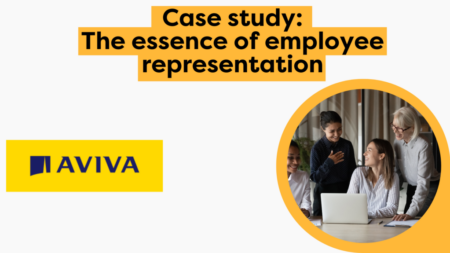Case study: The essence of employee representation
Aviva, one of the UK’s leading Insurance, Wealth and Retirement businesses, has long been a champion for good business practices. They were accredited by the Good Business Charter in 2021.
Danny Harmer, Chief People Officer at Aviva is clear about their approach:
In discussions with Aviva post-accreditation, we were particularly impressed by the way they approach the employee representation component.
We invited Anthony Fitzpatrick, Head of Colleague Experience and Employment Policy at Aviva, to speak at a GBC webinar “Creating Supportive and Inclusive Workplaces”. This blog pulls out the key lessons shared at this webinar, on how Aviva engages with its employees and harnesses their voices to ensure employee representation.
A culture that values the individual
Anthony shared that Aviva’s philosophy is simple:
Aviva’s approach of capturing feedback via different channels means views that might otherwise be missed are included.
Aviva established an employee council of democratically elected representatives from each team and inclusive of all grades to ensure diverse representation and meaningful dialogue. Significant business decisions are brought to the employee council for consultation. In addition to the employee council, Aviva:
- Have a strong relationship with Unite the Union, with colleagues attending regular meetings
- Conduct a ‘Voice of Aviva’ annual survey, with the results shared externally
- Ask employees to fill out Pulse surveys regularly throughout the year to get a sense check on key issues related to life at Aviva
Anthony explained that keeping things simple is key to effective employee representation, and Aviva’s approach demonstrates this. Overcomplication often detracts from the essence of the conversation – by fostering open dialogue, removing barriers, and promoting diversity of thought, organisations can make sure employees’ views are heard, in turn creating a robust foundation for growth and innovation.
Trust is central
Anthony outlined that central to this approach is the notion of trust, with real importance placed on regular, transparent communication to make sure employees are not only comfortable talking openly but confident their views will be acted upon. He stressed that from soliciting feedback on business strategies, to seeking input on improvement initiatives, creating a culture of trust and collaboration is paramount.
A one size fits all approach to employee representation may not be fully representative. The approach Aviva is taking has delivered representative outcomes. Whether through trade unions or other models, the essence lies in meaningful engagement and information sharing. By prioritising accessibility, confidentiality, and anonymity, organisations can foster an environment where employees feel valued and respected.
Empowering voices is not just an obligation – it’s the cornerstone of success
Anthony left us with this advice:
We’re truly inspired by Aviva’s thoughtful and impactful approach to employee representation. Their commitment to fostering trust, transparency, and meaningful engagement serves as a powerful example for organisations looking to elevate their own practices.
At the Good Business Charter, we believe empowering employees is key to building a better, more inclusive workplace. To learn more about the employee representation component of the GBC and discover practical resources for your organisation, visit our Employee Representation component page.
Let’s work together to ensure every voice is heard and every organisation thrives.

